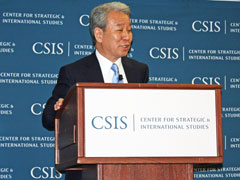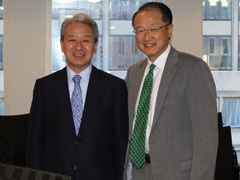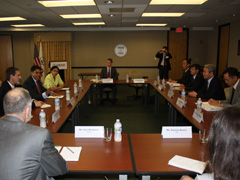From July 23 to 25, JICA President Akihiko Tanaka visited Washington, DC, and gave an address on the “Prospects for US-Japan Cooperation in Development” at the Center for Strategic and International Studies (CSIS). While in the US capital, he also held talks with World Bank President Jim Yong Kim, US Agency for International Development (USAID) Administrator Rajiv Shah, and Brookings Institution President Strobe Talbott to exchange information and opinions on the affairs of the respective agencies and to advance these already-strong relationships.
Partnership with the US on health, agriculture and PPPs
More than 200 people attended Tanaka’s address at CSIS on July 23, including development specialists, scholars of Japan-US relations, and members of the press.
In his speech, Tanaka declared that “US-Japan cooperation in development assistance is beginning to blossom.” From global health to food security to public-private partnerships, the two countries are finding many opportunities to work together.

Tanaka speaks at CSIS
Health programs designed by Japan and the US are closely aligned at the policy and operational levels to eradicate infections, improve maternal and child health outcomes, and strengthen health systems. In particular, the two countries are planning how to complement each other’s health programs in Bangladesh, Senegal, and Ghana to produce better results.
Tanaka explained that both the US and Japan have concluded that food security is vitally important, and the two countries are working together in this sector as well. Tanaka stated, “Japan’s strengths lie in training agricultural workers, increasing agricultural productivity, and managing water resources. Meanwhile, the US has expertise in post-harvest processing and storage, increasing market access and promoting public-private partnerships.” Based on those corresponding strengths, JICA and USAID have signed a memorandum of understanding to deepen collaboration on agricultural development with an initial focus on Tanzania, Ghana, Rwanda and Senegal, said Tanaka.
Public-private partnerships also represent a promising field for US-Japan teamwork. Tanaka said that the Japanese and US private sectors have innovative technologies and products with potential to positively impact development and that JICA and USAID are exploring opportunities to leverage their expertise. In particular, he reported that JICA and USAID are forming a partnership to introduce private capital into water projects in Africa, and they are working together in Ghana to expand the use of a nutritious supplement developed by the Japanese food company Ajinomoto Co., Inc. to improve infant nutrition.
Prospects for Japan-US cooperation
Looking beyond the present Japan-US partnership, Tanaka discussed five priority areas for deeper engagement: China, Afghanistan, Myanmar, the Asia-Pacific region, and the post MDGs agenda.
Now that China has shifted from being mainly an aid recipient to a development assistance provider, Tanaka suggested that the US and Japan should further engage with China and other emerging donors to improve mutual understanding, share best practices, and encourage development cooperation.
Afghanistan is a priority country for both the US and Japan. With the presidential election and the withdrawal of the International Security Assistance Force scheduled in 2014, Tanaka remarked that now is a critical time for the Afghanistan. In order to help Afghanistan’s sustainable development, Tanaka urged donors to provide ‘seamless assistance in terms of geography and time,’ to take into account both short-term and long-term perspectives, and to provide support to neighboring countries to ensure regional stability.
Myanmar is another fragile state in Asia, while it faces a different set of difficulties. Although the country is rapidly moving toward democratization, it still faces a multitude of challenges, including reconciliation with ethnic minorities, fiscal reforms to liberalize the economy, poverty reduction, and weak governance. Tanaka stressed that extensive coordination is required by donor countries, including the US and Japan, and international organizations to assist the country.
In the Asia-Pacific region, Tanaka said that there are plenty of opportunities for US-Japan cooperation to increase economic growth and security. As a result of the Japan-US Security Consultative Committee (the so-called “2+2” framework) meeting this April, the US and Japan confirmed that they will work together to secure peace, stability, and prosperity throughout region, and that there may be room for more strategic use of ODA.
Lastly, regarding the post-MDGs agenda, Tanaka acknowledged the array of new development actors and emerging global issues such as climate change, food security, natural disasters, and inclusive growth require more attention and concerted action. He urged the US and Japan to broaden the global development agenda, to include more players, and to take leadership in the quest for solutions.
Encouraging close cooperation with the World Bank, USAID, and the Brookings Institution
Tanaka also held talks with leadership from the World Bank, USAID, and the Brookings Institution. In Tanaka’s first meeting with Dr. Jim Kim, who became the World Bank’s new president on July 1, Kim expressed his gratitude for the close cooperative relationship between JICA and the World Bank and gave high praise for JICA health projects based on his previous experiences at the World Health Organization.
Dr. Kim and Tanaka pledged to work together closely to ensure the success of the upcoming World Bank/IMF Annual Meetings in Tokyo this October, including the Program of Seminars to be co-sponsored by JICA and the World Bank. They also exchanged information and opinions on operations in countries of mutual interest and plans for the Fifth Tokyo International Conference on African Development (TICAD) which will take place in Japan next year.

Tanaka (left) and Kim
In Tanaka’s meeting with Dr. Rajiv Shah of USAID, the two leaders primarily discussed food security, global health, and public-private partnerships.
The US has been taking an active lead to encourage G8 support for food security in Africa, and Dr. Shah welcomed Japan’s contribution to the G8’s New Alliance for Food Security and Nutrition[1]. Japan and the US will co-chair the country plan for Mozambique to align the country’s policy reforms with donor and private sector funding commitments.
On global health, the two sides noted that the biennial USAID-Japan Global Health Partnership consultations are scheduled for later this year. The discussions will likely focus on how the two countries will contribute to progress on ending preventable child deaths, designing common metrics to evaluate health outcomes, and enhancing field-level collaboration in countries where they both have large health programs.
Lastly the two agencies discussed prospects for more public-private partnerships between Japan and the US. Tanaka mentioned that JICA recently resumed its private sector investment finance (PSIF) facility, which allows JICA to provide equity or loans directly to the private sector in developing countries. Dr. Shah thought that there could be promising opportunities to utilize JICA’s PSIF scheme and USAID’s Development Credit Authority (DCA) loan guarantees together.
In his final meeting in Washington, Tanaka met with Dr. Strobe Talbott, President of the Brookings Institution. The two organizations have a fruitful partnership, which has included joint research on development effectiveness and scaling up successful development approaches. At the meeting, the two leaders discussed their ongoing research collaboration on the Arab Spring. The study intends to explore how to promote private sector development, youth employment, and inclusive growth in the Middle East, and the preliminary findings will be released later this fall.

Shah (third from left) and Tanaka (third from right)
Notes
[1] The G8 New Alliance for Food Security and Nutrition is a partnership between African countries, the G8 and the private sector to mobilize support and private capital for Africa’s agricultural sector. To date, cooperation framework documents have been formulated under US leadership for Ethiopia, Ghana and Tanzania. Additional cooperation frameworks are slated for Burkina Faso, Mozambique and Cote d’Ivoire, for a total of six New Alliance pilot countries.




scroll